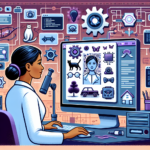-
Table of Contents
“Unlocking Tomorrow: The Quantum Leap into the Future of Computing”
Introduction

The Rise of Quantum Computing: What It Means for the Future
Quantum computing represents a revolutionary leap in the field of information technology, promising to transform industries and solve complex problems that are currently intractable for classical computers. By leveraging the principles of quantum mechanics, such as superposition and entanglement, quantum computers can process vast amounts of data simultaneously, offering unprecedented computational power. This technological advancement has the potential to impact various sectors, including cryptography, material science, pharmaceuticals, and artificial intelligence. As quantum computing continues to evolve, it is poised to redefine the boundaries of what is computationally possible, ushering in a new era of innovation and discovery.
Understanding Quantum Computing: A Beginner’s Guide
Quantum computing, a term that once seemed confined to the realm of science fiction, is rapidly becoming a tangible reality. As traditional computers approach the limits of their processing power, quantum computing offers a revolutionary approach that promises to transform industries and redefine the boundaries of what is computationally possible. To understand the implications of this technological leap, it is essential to grasp the fundamental principles that underpin quantum computing.
At its core, quantum computing leverages the principles of quantum mechanics, a branch of physics that deals with the behavior of particles at the atomic and subatomic levels. Unlike classical computers, which use bits as the smallest unit of data, quantum computers use quantum bits, or qubits. While a classical bit can exist in one of two states, either 0 or 1, a qubit can exist in multiple states simultaneously due to a property known as superposition. This allows quantum computers to process a vast amount of information at once, exponentially increasing their computational power.
Moreover, qubits are interconnected through a phenomenon called entanglement. When qubits become entangled, the state of one qubit is directly related to the state of another, regardless of the distance between them. This interconnectedness enables quantum computers to perform complex calculations with unprecedented speed and efficiency. Consequently, problems that would take classical computers millennia to solve could potentially be addressed in mere seconds by quantum computers.
However, the transition from theoretical models to practical applications is fraught with challenges. Quantum systems are highly sensitive to their environment, and maintaining the delicate state of qubits requires extremely low temperatures and isolation from external interference. Despite these hurdles, significant strides have been made in recent years. Companies like IBM, Google, and Microsoft are investing heavily in quantum research, and prototype quantum computers are already demonstrating their potential.
The implications of quantum computing are profound and far-reaching. In the field of cryptography, for instance, quantum computers could render current encryption methods obsolete, necessitating the development of new, quantum-resistant algorithms. This has significant implications for data security, privacy, and national security. Additionally, quantum computing holds promise for advancements in fields such as drug discovery, material science, and artificial intelligence. By simulating molecular interactions at an unprecedented level of detail, quantum computers could accelerate the development of new medications and materials, leading to breakthroughs that were previously unimaginable.
Furthermore, the integration of quantum computing with artificial intelligence could revolutionize machine learning and data analysis. Quantum algorithms have the potential to process and analyze vast datasets more efficiently than classical algorithms, enabling more accurate predictions and insights. This could transform industries ranging from finance to healthcare, where data-driven decision-making is crucial.
Nevertheless, the journey towards widespread quantum computing is still in its early stages. While the potential is immense, practical, large-scale quantum computers are likely years, if not decades, away. In the meantime, hybrid approaches that combine classical and quantum computing are being explored to harness the strengths of both paradigms.
In conclusion, understanding quantum computing is essential for grasping the future trajectory of technology. As research progresses and practical applications emerge, quantum computing promises to unlock new frontiers in science, industry, and beyond. While challenges remain, the relentless pursuit of innovation continues to push the boundaries of what is possible, heralding a new era of computational capability.
The Impact of Quantum Computing on Cybersecurity
Quantum computing, a field that has long been the subject of theoretical exploration, is now making significant strides toward practical application. As this technology advances, its implications for various sectors are becoming increasingly apparent. One area where quantum computing is poised to have a profound impact is cybersecurity. The advent of quantum computers promises to revolutionize the way we approach data protection, but it also introduces new challenges that must be addressed.
To understand the impact of quantum computing on cybersecurity, it is essential to grasp the fundamental differences between classical and quantum computers. Classical computers, which form the backbone of current cybersecurity systems, process information in binary bits—either 0s or 1s. In contrast, quantum computers use quantum bits, or qubits, which can exist in multiple states simultaneously due to the principles of superposition and entanglement. This capability allows quantum computers to perform complex calculations at unprecedented speeds, potentially rendering many of today’s encryption methods obsolete.
One of the most significant concerns in the cybersecurity community is the potential for quantum computers to break widely-used cryptographic algorithms. Currently, encryption methods such as RSA and ECC rely on the difficulty of factoring large numbers or solving discrete logarithm problems—tasks that are computationally intensive for classical computers. However, quantum algorithms like Shor’s algorithm can solve these problems exponentially faster, posing a threat to the security of encrypted data. If quantum computers reach a level of maturity where they can efficiently run such algorithms, the confidentiality of sensitive information, from financial transactions to state secrets, could be at risk.
In response to this looming threat, researchers and organizations are actively working on developing quantum-resistant cryptographic techniques. These new methods aim to secure data against the capabilities of quantum computers, ensuring that information remains protected even in a post-quantum world. One promising approach is lattice-based cryptography, which relies on the hardness of lattice problems that are believed to be resistant to quantum attacks. Additionally, the National Institute of Standards and Technology (NIST) is leading an initiative to standardize post-quantum cryptographic algorithms, with the goal of providing robust security solutions for the future.
While the potential risks posed by quantum computing to cybersecurity are significant, it is also important to recognize the opportunities it presents. Quantum computing could enhance cybersecurity measures by enabling the development of more sophisticated encryption techniques and improving the detection of cyber threats. For instance, quantum key distribution (QKD) leverages the principles of quantum mechanics to create secure communication channels that are theoretically immune to eavesdropping. By detecting any attempt to intercept the key, QKD ensures that the integrity of the communication remains intact.
Moreover, quantum computing could revolutionize the field of cryptanalysis, allowing for the identification and mitigation of vulnerabilities in existing cryptographic systems. This capability could lead to the creation of more resilient security protocols, ultimately strengthening the overall cybersecurity landscape.
In conclusion, the rise of quantum computing represents both a challenge and an opportunity for cybersecurity. As quantum technology continues to evolve, it is imperative for researchers, policymakers, and industry leaders to collaborate on developing quantum-resistant cryptographic methods and leveraging the potential benefits of quantum computing. By proactively addressing the risks and harnessing the opportunities, we can ensure that the future of cybersecurity remains robust and resilient in the face of this transformative technology.
Quantum Computing and Its Potential to Revolutionize Healthcare
Quantum computing, a field that once seemed confined to the realm of science fiction, is rapidly becoming a tangible reality with the potential to revolutionize various sectors, including healthcare. As traditional computing approaches their limits in processing power and efficiency, quantum computing offers a paradigm shift, promising unprecedented computational capabilities. This leap forward could transform the way we understand, diagnose, and treat diseases, ultimately reshaping the healthcare landscape.
At the heart of quantum computing lies the qubit, a fundamental unit that, unlike classical bits, can exist in multiple states simultaneously due to the principles of superposition and entanglement. This unique property allows quantum computers to process vast amounts of data at speeds unattainable by classical computers. Consequently, the healthcare industry, which relies heavily on data analysis and complex simulations, stands to benefit immensely from these advancements.
One of the most promising applications of quantum computing in healthcare is in drug discovery and development. Traditional drug discovery is a time-consuming and costly process, often taking years and billions of dollars to bring a new drug to market. Quantum computers, however, can simulate molecular interactions at an atomic level with remarkable precision, enabling researchers to identify potential drug candidates more quickly and accurately. This capability could significantly reduce the time and cost associated with drug development, accelerating the delivery of new treatments to patients.
Moreover, quantum computing holds the potential to revolutionize personalized medicine. By analyzing vast datasets of genetic information, quantum computers can identify patterns and correlations that would be impossible for classical computers to detect. This ability to process and interpret complex genetic data could lead to more accurate diagnoses and tailored treatment plans, improving patient outcomes. For instance, quantum algorithms could help identify specific genetic mutations responsible for certain diseases, allowing for the development of targeted therapies that address the root cause of the condition.
In addition to drug discovery and personalized medicine, quantum computing could also enhance medical imaging and diagnostics. Techniques such as magnetic resonance imaging (MRI) and computed tomography (CT) scans generate enormous amounts of data that require sophisticated algorithms to interpret. Quantum computers, with their superior processing power, could analyze these images more efficiently, leading to faster and more accurate diagnoses. This improvement in diagnostic capabilities could be particularly beneficial in detecting diseases at an early stage, where treatment is often more effective.
Furthermore, the integration of quantum computing with artificial intelligence (AI) could unlock new possibilities in healthcare. AI algorithms, which are already being used to predict disease outbreaks, optimize treatment plans, and assist in surgical procedures, could be significantly enhanced by the computational power of quantum computers. This synergy between quantum computing and AI could lead to more advanced predictive models, better decision-making tools for healthcare professionals, and ultimately, improved patient care.
However, despite its immense potential, the widespread adoption of quantum computing in healthcare is not without challenges. The technology is still in its nascent stages, and significant advancements are needed before it can be fully integrated into clinical practice. Issues such as error rates, qubit stability, and the development of practical quantum algorithms must be addressed. Additionally, the healthcare industry will need to invest in the necessary infrastructure and training to harness the power of quantum computing effectively.
In conclusion, while quantum computing is still an emerging technology, its potential to revolutionize healthcare is undeniable. From accelerating drug discovery to enabling personalized medicine and enhancing diagnostic capabilities, the impact of quantum computing on healthcare could be profound. As researchers and industry leaders continue to explore and develop this technology, the future of healthcare looks increasingly promising, with quantum computing poised to play a pivotal role in shaping it.
The Future of Artificial Intelligence with Quantum Computing
The rise of quantum computing heralds a transformative era for artificial intelligence (AI), promising to revolutionize the way we process information and solve complex problems. As traditional computing approaches the limits of its capabilities, quantum computing offers a new paradigm that could significantly enhance AI’s potential. This emerging technology leverages the principles of quantum mechanics to perform computations at unprecedented speeds, enabling the processing of vast amounts of data more efficiently than ever before.
One of the most compelling aspects of quantum computing is its ability to handle complex optimization problems that are currently intractable for classical computers. These problems, which involve finding the best solution from a vast number of possibilities, are central to many AI applications, such as machine learning, natural language processing, and predictive analytics. By harnessing the power of quantum bits, or qubits, quantum computers can explore multiple solutions simultaneously, dramatically reducing the time required to arrive at an optimal solution. This capability could lead to significant advancements in AI, allowing for more accurate predictions, faster decision-making, and improved problem-solving abilities.
Moreover, quantum computing’s potential to enhance machine learning algorithms is particularly noteworthy. Machine learning, a subset of AI, relies on the ability to process and analyze large datasets to identify patterns and make predictions. Quantum computing can accelerate this process by performing complex calculations more quickly and efficiently than classical computers. For instance, quantum algorithms such as the Quantum Approximate Optimization Algorithm (QAOA) and the Variational Quantum Eigensolver (VQE) have shown promise in solving optimization problems that are critical to machine learning. As a result, AI systems powered by quantum computing could become more adept at recognizing patterns, making predictions, and adapting to new information.
In addition to improving the efficiency of AI algorithms, quantum computing also holds the potential to enhance the security of AI systems. Quantum cryptography, which uses the principles of quantum mechanics to secure data, could provide a higher level of protection against cyber threats. This is particularly important as AI systems become more integrated into critical infrastructure and everyday life. By ensuring the integrity and confidentiality of data, quantum cryptography could help safeguard AI applications from malicious attacks and unauthorized access.
However, the integration of quantum computing into AI is not without its challenges. The development of practical and scalable quantum computers remains a significant hurdle, as current quantum systems are still in their infancy and prone to errors. Additionally, the complexity of quantum algorithms and the need for specialized knowledge to develop and implement them pose further obstacles. Despite these challenges, ongoing research and investment in quantum computing are driving progress, with major technology companies and research institutions making significant strides in advancing the field.
As quantum computing continues to evolve, its impact on AI is likely to be profound. The synergy between these two cutting-edge technologies has the potential to unlock new possibilities and drive innovation across various industries. From healthcare and finance to transportation and cybersecurity, the applications of AI powered by quantum computing are vast and far-reaching. By enabling more efficient data processing, enhanced machine learning, and improved security, quantum computing could usher in a new era of AI, transforming the way we live and work.
In conclusion, the rise of quantum computing represents a pivotal moment for the future of artificial intelligence. While challenges remain, the potential benefits of integrating quantum computing with AI are immense. As we continue to explore and develop this groundbreaking technology, we can anticipate a future where AI systems are more powerful, efficient, and secure, ultimately leading to a smarter and more connected world.
Conclusion
The rise of quantum computing represents a transformative leap in technology, promising to revolutionize fields such as cryptography, materials science, and complex system modeling. By harnessing the principles of quantum mechanics, quantum computers can solve certain problems exponentially faster than classical computers, potentially leading to breakthroughs in drug discovery, optimization, and artificial intelligence. However, significant technical challenges remain, including error correction and qubit stability. As these hurdles are overcome, quantum computing is poised to unlock unprecedented computational power, driving innovation and reshaping industries, ultimately heralding a new era of technological advancement and scientific discovery.





